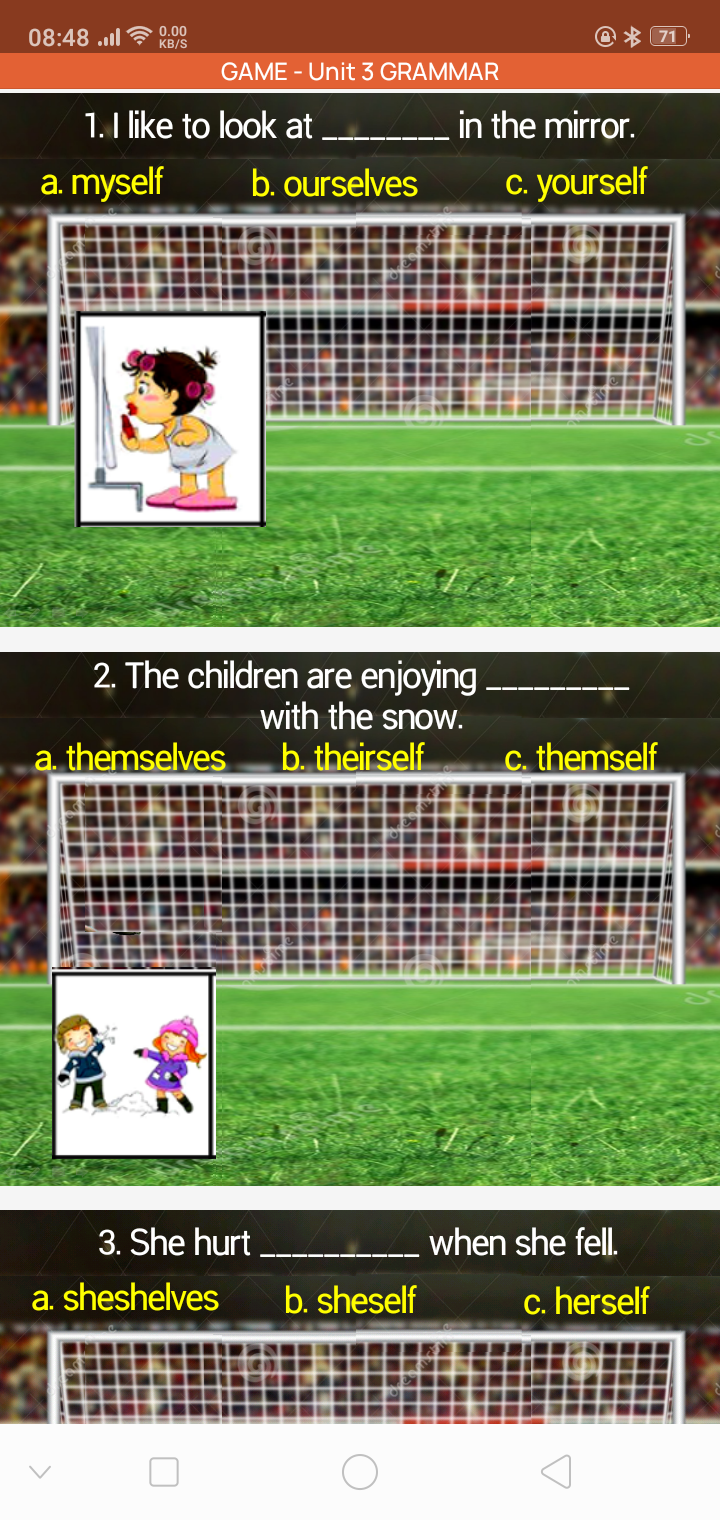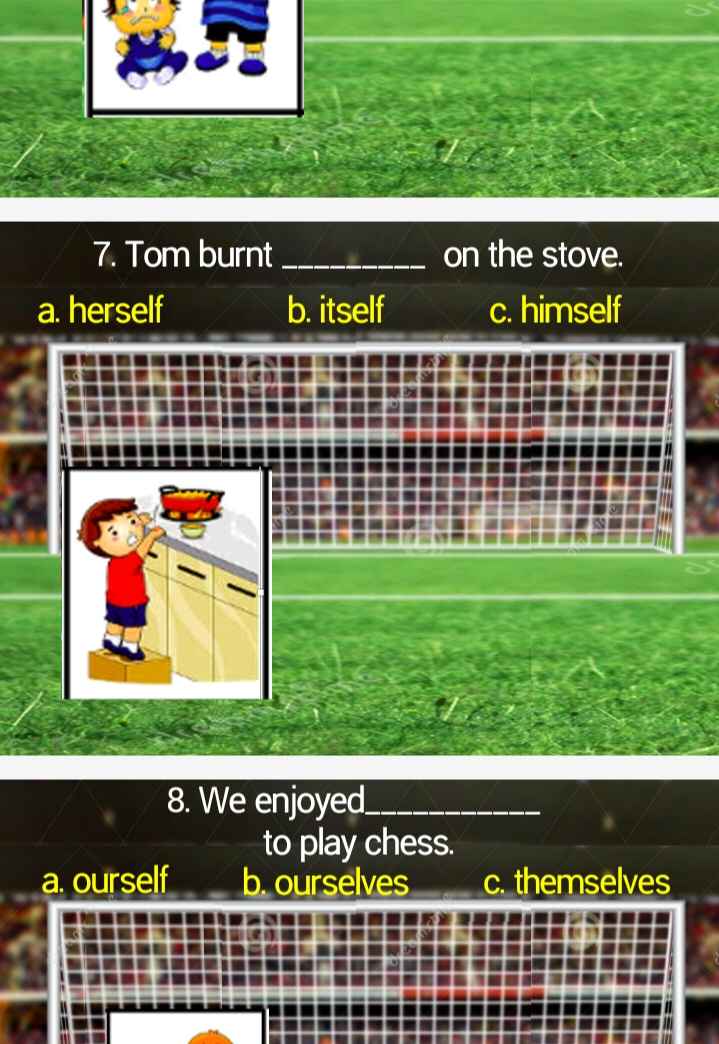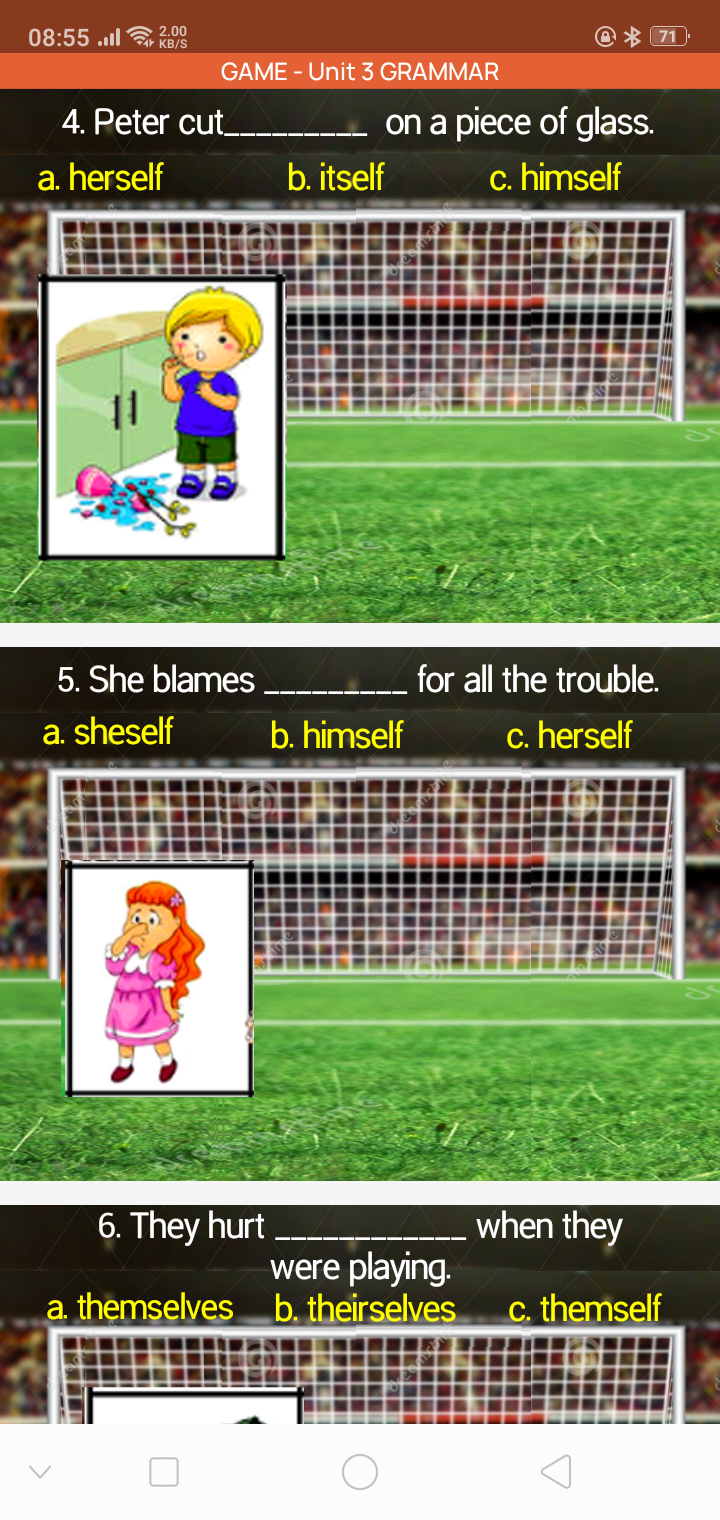Unit 3 : At home : Test 2
Các câu hỏi tương tự
complete the sentence with the correct modal verb and make a goal:
complete the sentence with the correct modal verb and make a goal:
Complete the second senten so that it means the same as the first. Use the corect modal verb and any other necessary words.
1. It is very important that you check in your luggage an hour before your flight.
You .... your luggage an hour before your flight.
2. Smoking is not allowed in the doctor's waiting room.
All employees .... to use a computer.
Complete the second sentence so that it has a similar meaning to the first
1. You arent allowed to make noisy in the library
You mustnt ______________________________
2. It isnt necessary for you to go to school so early
You dont _________________________________
3. It is a good thing for you keep the house clean and tidy
You ought ____________________________________
4. I had a good time at the party last night
I enjoyed ___________________________
5. Must he leave now ?
Does he ____...
Đọc tiếp
Complete the second sentence so that it has a similar meaning to the first
1. You aren't allowed to make noisy in the library
You mustn't ______________________________
2. It isn't necessary for you to go to school so early
You don't _________________________________
3. It is a good thing for you keep the house clean and tidy
You ought ____________________________________
4. I had a good time at the party last night
I enjoyed ___________________________
5. Must he leave now ?
Does he ___________________
6. Playing with matches is very dangerous
It's very dangerous ____________________________
7. You must stay in bed because for you illness
You must stay in bed because you ____________
8. It isn't necessary for you to water that tree every day
You don't have _____________________________________
9. He stays up too late and he is always tired the next morning
He should go __________________________________________
10. It is dangerous to put a knife into an electrical socket
Putting a knife ___________________________________
Read the text carefully, then choose the correct answers.
For 3,000 years, Mongolians have lived in the rural areas, adopting a pastoral way of life, moving in the
search of new pastures. They depend largely on their livestock for a living and sustain themselves with what
they can get from the land. Today, approximately half of Mongolia’s population is still roaming the vast plains
living in the ger and moving their campings several timesa year. Nomadic life thrives in summer and survives
in win...
Đọc tiếp
Read the text carefully, then choose the correct answers.
For 3,000 years, Mongolians have lived in the rural areas, adopting a pastoral way of life, moving in the
search of new pastures. They depend largely on their livestock for a living and sustain themselves with what
they can get from the land. Today, approximately half of Mongolia’s population is still roaming the vast plains
living in the ger and moving their campings several timesa year. Nomadic life thrives in summer and survives
in winter. When temperatures are warm, they work hard on their farms to get milk and make airag, consuming
meat from their sheeps and goats. Once winter comes, temperatures dip extremely low and they stay indoors
and survive on horse meat.
With the rise of technology, changes in the Mongolian nomadic lifestyle are almost inevitable. While they
still lead their lifestyle as pastoral herders, many use motorbikes to herd cattle and horses. To move their
homes, trucks have taken the place of ox carts. Solar panels are also becoming an addition to the ger, giving
them access to electricity without being confined to one place. The nomads use solar energy to power television
sets and mobile phones.
1. Mongolians regularly move from place to place in order to _________.
a.look for food for their family b. find pastures for their livestock
c. herd their cattle and horses d. sell their animals and farm products
2. How many Mongolians still live a traditional nomadic life?
a.Close to 40 percent b. More than 50 percent
c. About 50 percent d. Approximately 60 percent
3. What is a ger?
a.A portable, round tent b. A thatched house
c. A circular house made of snow d. A wooden hut
4. What is the Mongolian’s main food in winter?
a.airag b. goat meat c. sheep meat d. horse meat
5. Today, Mongolian nomads _________.
a.don’t lead their lifestyle as herders any more
b.use ox carts to move their homes
c.use solar energy to power electronic devices
d.have the advantage of urban life
6. Which of the followings is NOT true about Mongolian nomads?
a.They live in the countryside.
b.They live by and for their livestock.
c.They work hard in winter when the temperature dip very low.
XII. Choose the word which best fits each gap.
Although the city seems to have a lot of great things, the country can offer as (1)_________ satisfaction as well. The country is a marvelous place to live in. It offers a very relaxing feeling, and it is filled (2)_________ magnificent views and scenery. Rural towns offer more open space than cities and aren’t overcrowded. The country can also maybe help you become a more independent and (3)_________ person. You can buy a small piece of land...
Đọc tiếp
XII. Choose the word which best fits each gap.
Although the city seems to have a lot of great things, the country can offer as (1)_________ satisfaction as well. The country is a marvelous place to live in. It offers a very relaxing feeling, and it is filled (2)_________ magnificent views and scenery. Rural towns offer more open space than cities and aren’t overcrowded. The country can also maybe help you become a more independent and (3)_________ person. You can buy a small piece of land, plough it and put some (4)_________ in order to grow your own vegetables. This way you (5)_________ your own crops, and eat and live in a very healthy way. (6)_________, being in the countryside makes you more of an outdoor person often enjoying the voices and wild places of nature. Not everyone is (7)_________ to the city life and not everyone has the desire to live permanently in the countryside. It is a matter of perspective and personal point of (8)_________.
1. a. most b. more c. much d. many
2. a. in b. out c. up d. with
3. a. active b. idle c. passive d. quiet
4. a. weeds b. seeds c. breeds d. branches
5. a. collect b. damage c. complete d. rotate
6. a. By contrast b. However c. Therefore d. In addition
7. a. Interested b. bored c. suited d. excited
8. a. care b. view C. contact d. way
Work in groups. Each group makes as many compound sentences as possible. The group with the most correct sentences is the winner.
IV. Complete the sentences with the adjectives from the box.
generous peaceful optimistic quiet inconvenient
fresh brave exciting vast skillful envious
1. It’s ____________ to see a kite flying high in the sky.
2. It was very ____________ there; you could just hear the wind moving in the trees.
3. I love the ____________ open spaces and the ____________ air in the coun...
Đọc tiếp
IV. Complete the sentences with the adjectives from the box.
generous peaceful optimistic quiet inconvenient
fresh brave exciting vast skillful envious
1. It’s ____________ to see a kite flying high in the sky.
2. It was very ____________ there; you could just hear the wind moving in the trees.
3. I love the ____________ open spaces and the ____________ air in the countryside.
4. The villagers often find it ____________ to get into town due to the lack of public transport.
5. People in rural areas are more ____________ than their city counterparts.
6. I’m so ____________ of you getting such an exciting holiday.
7. Billy is clearly a ____________ person. He contributed lots of money to charity.
8. It was very ____________ of him to jump into the river to save a drowning child,.
9. Most of Mongolian people are ____________ at riding a horse.
10. Life in the countryside is more ____________ and healthier.
Mong các bạn giúp!
The Mường is an ethnic group native to Vietnam; it is the country’s third (1)_____________ of 53 minority groups, with an estimated population of 1.26 million (based on the 2009 census and five years of population growth). The Muong people inhabit the (2)_____________region of northern Vietnam, concentrated in Hoa Binh Province and the mountainous districts of Thanh Hoa Province. They are most closely (3)_____________ to the ethnic Vietnamese (Kinh). The term muong of Thaiorigin (4)_____________...
Đọc tiếp
The Mường is an ethnic group native to Vietnam; it is the country’s third (1)_____________ of 53 minority groups, with an estimated population of 1.26 million (based on the 2009 census and five years of population growth). The Muong people inhabit the (2)_____________region of northern Vietnam, concentrated in Hoa Binh Province and the mountainous districts of Thanh Hoa Province. They are most closely (3)_____________ to the ethnic Vietnamese (Kinh). The term "muong" of Thai
origin (4)_____________ "district, region". To emphasize their difference (5)_____________the inhabitants of the valleys and highlanders, Muong call themselves "monglong", which means "people living in the centre". While the Muong are believed to be related to the Vietnamese, ethnologists (6)_____________ theorized that the Muong and Kinh (ethnic Vietnamese) separation happened when the proto-Vietnamese became (7) _____________ Sinicised, beginning from the 111 BC invasion (8)
_____________ Chinese Han dynasty Emperor Wu Ti, while the Muong, living the mountains and developed independently. The Muong (9)_____________ the Tai have had a mutual influence on each other's culture, so today the Muong are ethnically and linguistically close to the Vietnamese, but culturally and socially (10)_____________to the Tai.



